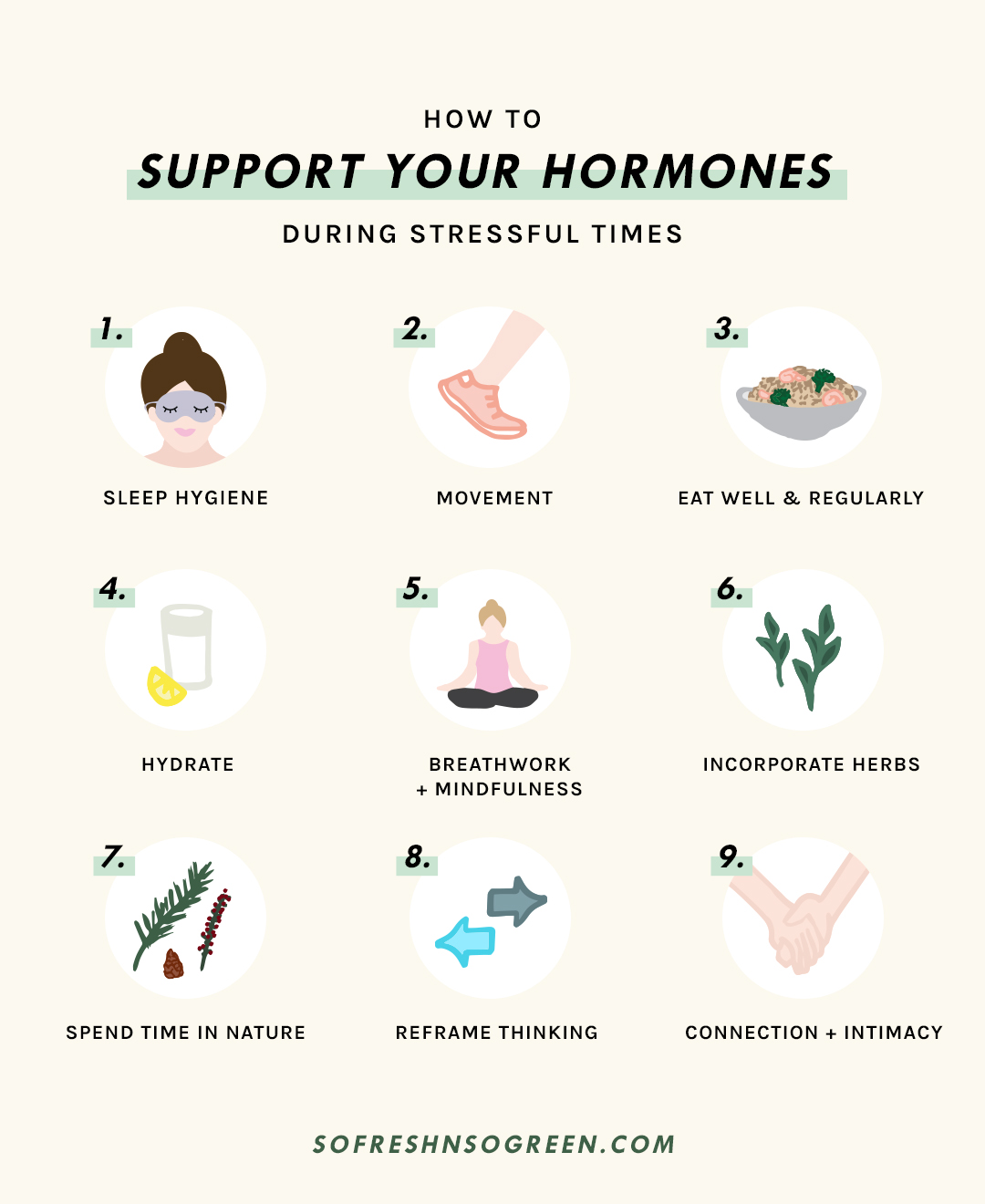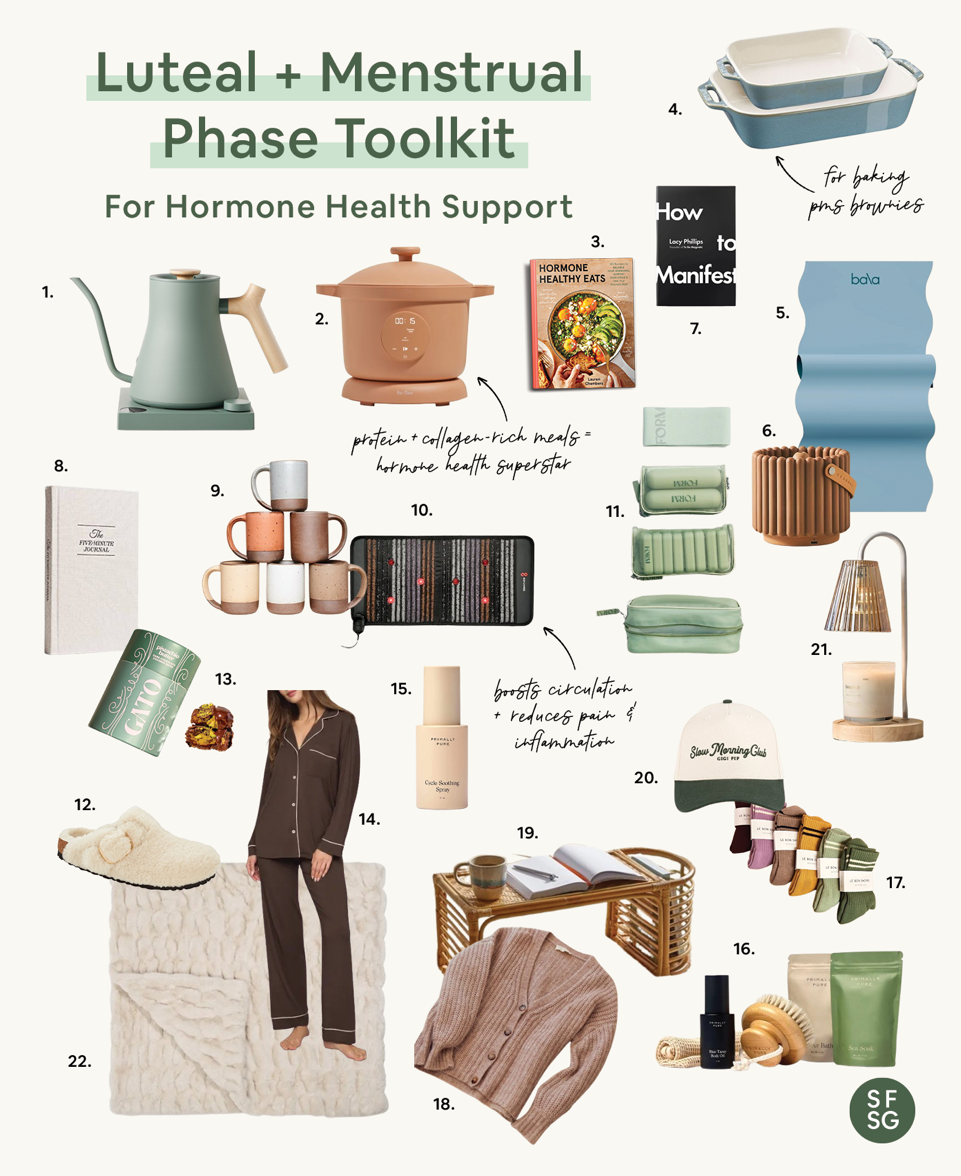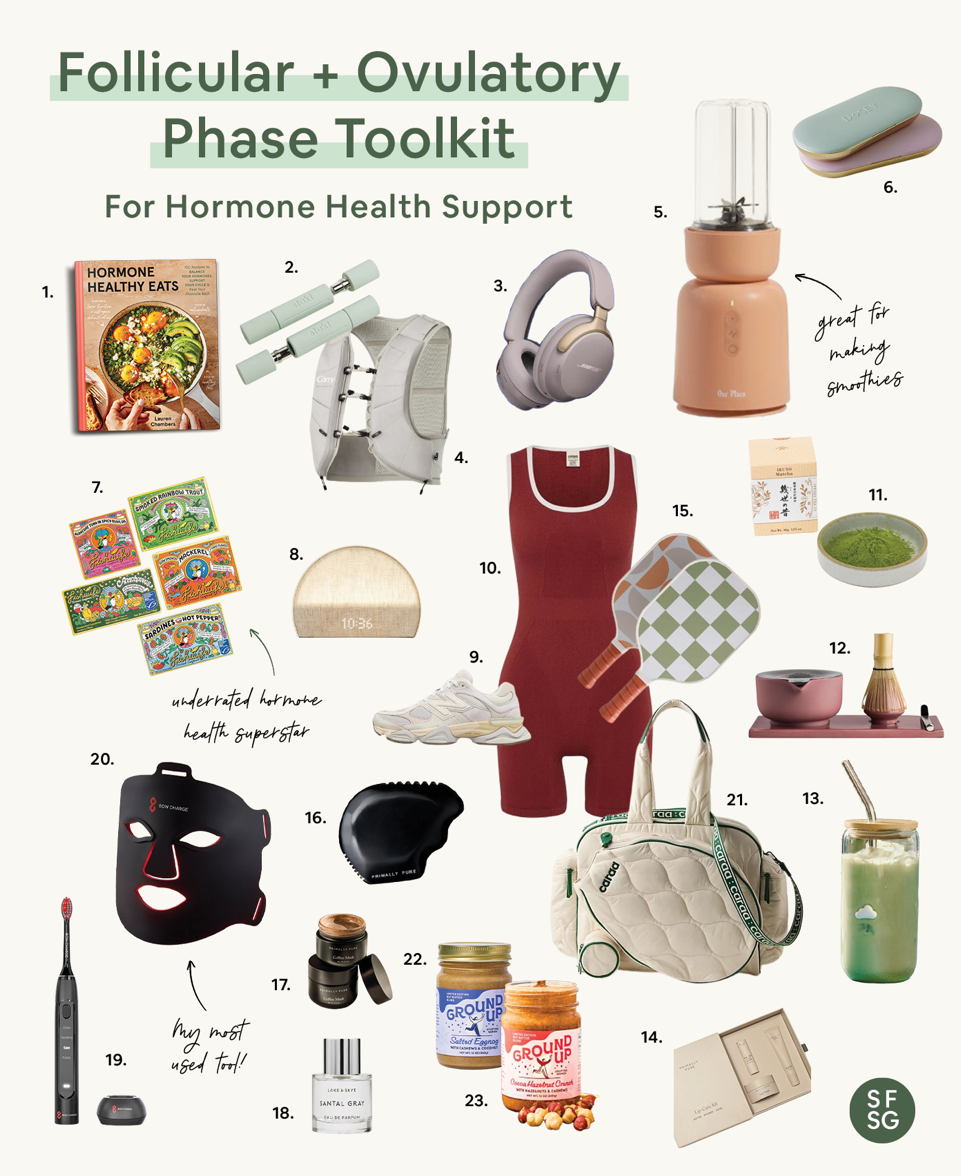recipes
lifestyle
wellness
motherhood
mindset
About
E-Books
Blog
Freebies
partnerships
hi, i'm lauren!
hey there!
I’m on a hot mission to help you balance your hormones & live your best life.
categories
Home
Quiz
Get In Touch
The Course
search:
Cookbook
Recipe key
GF
VG
P
Vegan
Gluten Free
Paleo
DF
Dairy-Free
download now
Join Hormone Healthy Eats!
Become a SFNSG insider to get my monthly Substack, Hormone Healthy Eats! Packed with the latest hormone-healthy recipes
+ tips.
jump to recipe >
Let’s be real, due to COVID-19 we’re living in some uncertain and unprecedented times, exposing many of us to daily stressors that can disrupt our hormones, monthly cycle, fertility, sleep and energy levels as a result.
Luckily, there’s plenty we can do at home, right now, to support our hormones during these stressful times. Read below for a better understanding of just how stress impacts our hormones, as well as tools you can use to immediately relieve stress and boost your overall health.
HOW YOUR BODY HANDLES STRESS
Our bodies were designed to handle short, succinct bursts of stress as a survival mechanism back in the primal days.
We’d see a saber tooth tiger and this stressor would cause a stress response in our body. This means our brain (specifically the hypothalamus) would perceive the threat and send a “danger” message to our adrenal glands. In response our adrenal glands would release the stress hormone cortisol into our bloodstream.
Cortisol’s role is to mobilize energy from storage sites in the body for immediate use. It does this by converting amino acids found in our liver and muscles into glucose, our most efficient source of fuel, so our bodies can use this for energy. It also puts a halt on almost all other systems and functions in the body to preserve energy (such as reproductive and digestive processes).
This is incredibly effective when we need to use that energy to occasionally run from a tiger, but not so effective when it’s chronically happening from stressors like fear-inducing media headlines, financial strains, or homeschooling your kids while WFH yourself, etc.
Because our bodies can’t tell the difference between a text or a tiger, it goes through the same stress response each time a perceived threat occurs. And because it’s rare that we need all of that extra energy produced physically to run from said tiger, it often times gets stored as fat, primarily around our mid-section.
HOW STRESS DISRUPTS YOUR HORMONES + MONTHLY CYCLE
Not only do we tend to put on weight when we’re chronically stressed, but other bodily functions become imbalanced as a result.
+ Interferes with Blood Sugar
An increase in cortisol levels disrupts your insulin’s ability to control blood sugar levels. This can increase levels of testosterone, preventing or delaying your body from releasing an egg during ovulation, or increase estrogen, which is linked to PMS, painful periods, fibroids or cysts, etc.
+ Decreases Progesterone
When cortisol demand gets high, your body steals the resources it needs from progesterone to meet it. This lowers progesterone levels, which is needed to get pregnant, sustain a healthy pregnancy, decrease PMS symptoms and have a regular cycle.
+ Delays or Prevents Ovulation
Increased cortisol levels can delay or even prevent an egg from being released in the uterus. This is your body’s way of prioritizing energy for survival vs. conception.
+ Increases PMS
A decrease in progesterone can lead to high estrogen or estrogen dominance, with symptoms ranging from painful periods, headaches, fibroids or cysts, mood swings, low libido and weight gain, primarily around the hip/butt/thigh area.
+ Changes the Length + Timing of Your Period
Your body is especially susceptible to stress after ovulation, which can cause changes in your period including spotting, early or late arrival, heavier bleeding and a shorter duration of cycle.
+ Causes Your Period To Go MIA
If you skipped ovulation due to excess stress, you can still have a breakthrough bleed, but it’s not actually considered a period. A late period (or period gone rogue) due to excess stress is a precursor to many serious health issues like cysts, PCOS, endometriosis, infertility, etc.
+ Adrenal Dysfunction Leading to Burnout or Fatigue
Constant cortisol output also puts immense strain on your adrenal glands, leading many people to experience adrenal dysfunction or burnout. Your adrenals get fatigued from the constant demand to release cortisol into your blood stream, and they eventually stop responding. This is known as a low-cortisol imbalance, where you rarely feel well-rested (even after a full night’s sleep) and depend on crutches like caffeine or sugar to get through the day.
It’s a vicious cycle, and our bodies and hormones are so intricately linked you can’t experience one imbalance without having it affect other systems in your body. This leads many people to experience multiple symptoms and imbalances as a result, affecting everything from your mood, sleep, energy and productivity levels, to your weight, fertility and health and happiness and it’s core.
*Think you might have a hormone imbalance? Take this quiz to find out.
TIPS TO SUPPORT YOUR HORMONES DURING STRESSFUL TIMES
As you can see, managing stress is a key pillar of hormone balance, a healthy menstrual cycle and fertility, but it’s not realistic to expect stress to just go away, as we will encounter stressful situations and events throughout our lifetime (and most likely the foreseeable future, given the world’s current state).
The important thing to focus on here is having tools available to manage and mitigate stress, so that we’re able to return to homeostasis and optimize our hormone health. Here’s my top stress-coping tools you can practice at home now.
1. Sleep Hygiene
Sleep is GOLD for our hormones and overall health. This is the time when our body gets to repair from damage done during the day and takes out the trash (i.e. filters and removes toxins from our brain). It’s crucial for regulating insulin (blood sugar balance), cortisol (stress response), our adrenal glands and inflammation.
IMO, the most effective way to get good quality sleep is to develop good sleep hygiene or a nightly routine. This means adopting relaxing nightly rituals like a hot bath or shower, cup of tea (I love kava or valerian root for sleep), taking supplements (magnesium or b6), reading, etc. while limiting exposure to sleep-inhibitors like electronics, anything anxiety-inducing, eating late at night, drinking alcohol, etc.
2. Movement
Consistent exercise and movement contributes to improved insulin regulation and sensitivity while decreasing stress and inflammation, all of which is important for optimal hormone health.
Try building some sort of movement into your daily routine (walking, streaming a workout class, etc.) in whatever way feels right for you. If you can, cycle-syncing your workouts by doing more HIIT during the first half of your cycle and low-impact workouts like yoga, walking or stretching the second half will work to lower stress while increasing visceral fat loss.
3. Eat Well + Regularly
A well-rounded, nutrient-dense diet is literally your best tool for balancing your blood sugar levels, optimizing gut and liver function and minimizing stress on the body.
Make sure you’re eating meals with an optimal balance of protein, fat and fiber regularly throughout the day and eating in a calm environment. This ensures your body can tap into its parasympathetic nervous system (aka rest and digest mode), which means your body will be able to utilize and absorb the nutrients you’re working so hard to obtain from food.
When possible, try minimizing foods that cause excess stress and inflammation in your body such as processed or sugary foods, excess caffeine or alcohol, conventional meats and vegetable oils.
**Check out my FREE Hormone-Healthy Pantry, Freezer + Fridge Guide for a checklist of the foods I’m keeping on hand right now to nourish our family and keep us healthy.
4. Hydrate
Proper hydration is crucial for every aspect of vitality and health, and all of our organs (especially our brains) depend on them to function optimally. Low levels of hydration can weaken your adrenals and hinder your body’s ability to eliminate harmful toxins and excess hormones.
While it’s important to ensure you’re drinking enough water (at least half your body weight in fluid oz) it’s equally as important to minimize dehydrating substances like caffeine and alcohol, which deplete your body of micronutrients it needs to produce hormones and reduce inflammation and stress in the body.
5. Breathwork + Meditation
Incorporating grounding practices like breathwork, mindfulness and meditation help us tap into our parasympathetic nervous system (aka our rest and digest mode) working to reduce cortisol levels and promote balance in the body. I love using guided meditation apps like Headspace, Oak or Insight Timer, as well as simple breathwork techniques like the 4-7-8 method.
6. Incorporate Herbs + Supplements
Adding herbs and adaptogens such as ashwagandha and holy basil to your routine can be an extremely effective way to lower cortisol and combat stress, while incorporating supplements like magnesium, b-vitamins and omega-3’s, work to replenish micronutrients that calm your nervous system, nourish your adrenals and reduce inflammation.
**I always recommend checking with your doctor before beginning any new supplement or herbs, especially if you are currently pregnant, breastfeeding or on other medication.
7. Spend Time In Nature
Numerous scientific studies report spending just 20 minutes in nature works to reduce stress levels in the body. Honestly, taking daily walks has been a total game-changer for me during this time. Try and get outside in whatever capacity you can (even if it’s just sitting in your backyard). Bonus points if you can do it earlier in the day, which works to align with your circadian rhythm and promote optimal sleep.
8. Reframe Thinking
There are physical stressors (like wear and tear on your muscles after a workout) and then there are emotional stressors (i.e. how we perceive stressful events like the news, a meeting, a busy schedule, etc.) The beauty of emotional stressors is that we have the power to shift our experience from anxious to accepting, simply by reframing the situation.
My go-to phrase to help me do so is “What is this doing FOR me instead of TO me?” I also love “Right now, it’s like this” which acknowledges your experience is very real, but it’s only temporary.
I’m not going to lie, reframing stressful thoughts to positive ones can be tough, but just like anything, with practice it gets much easier. I like to use tools that help my body release stress first (like getting out in nature or movement) and then when I’m in a more peaceful state work on releasing the stress from my mind.
9. Connection + Intimacy
Research has shown connection and intimacy to be extremely effective at lowering stress in the body (human touch, hugging and orgasms all release oxytocin, which decreases cortisol levels and promotes an overall sense of wellbeing). Both sex and self-pleasure are also important for regulating a healthy menstrual cycle and promoting optimal fertility.
Obviously, this one can be challenging during times of social-distancing, but if you have a partner or loved ones around, try giving lots of hugs or initiating intimacy. If not, connecting with friends or loved ones via FaceTime or video chat can still be effective at reducing stress.
**In need of more recipes, meal planning, herbs + supplements & lifestyle tips to help reduce stress, balance your hormones, promote a healthy menstrual cycle and boost your health during this time? Check out my 28-Day Hormone Balance Reset Plan for more support and a detailed action plan.
⠀⠀⠀⠀⠀⠀⠀⠀⠀

If you loved that...

01.

02.

03.

04.

05.
hey!
Keep Browsing
Site
Keep Browsing
Site
the
about
e-books
blog
downloads
quiz
Welcome friend, I'm lauren.
I’m honored to support you on your journey to optimal hormone health + happiness. Thanks for being here babe.


